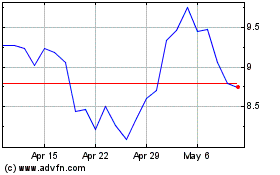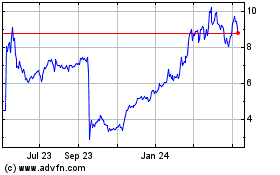ARS Pharmaceuticals, Inc. (Nasdaq: SPRY), a biopharmaceutical
company dedicated to empowering at-risk patients and their
caregivers to better protect patients from severe allergic
reactions that could lead to anaphylaxis, announced today that
seven abstracts will be featured tomorrow, Friday, October 25 at
the 2024 ACAAI Annual Scientific Meeting taking place in Boston,
Massachusetts. The posters highlight a wide range of studies
focused on intranasal epinephrine administration, including
cardiovascular safety, human factor study of carrying two devices
at all times, and real-world administration data in pediatric
patients.
“The research being presented at the ACAAI Annual Scientific
Meeting is part of the extensive body of knowledge that ARS has
contributed on epinephrine administration through our comprehensive
clinical research,” said Richard Lowenthal, Co-Founder, President,
and CEO of ARS Pharmaceuticals, the developer of
neffy® (epinephrine nasal spray) the first
and only needle-free treatment for Type I allergic reactions,
including anaphylaxis, in adults and children who weigh ≥30 kg (66
lbs.). “Our studies have brought forward valuable new data that
demonstrates nasal spray delivery of epinephrine is not only
successfully administered in real-world situations, but it also
provides valuable insights into the broader understanding of how
epinephrine works in the body. Our research contributes to the
allergy community’s knowledge of both neffy’s
performance and expands scientific findings and hypothesis, helping
us advance treatment options for patients with severe
allergies.”
The complete list of ARS Pharmaceuticals’ poster presentations
is below. Full posters can be viewed online here.
|
Poster Presentation #1 |
|
Time: |
3:15-3:30pm EDT |
|
Title: |
“Cardiovascular Safety of Intramuscular and Intranasal Epinephrine
Administration” |
| Authors: |
Jay A. Lieberman, Richard D Wainford, Carlos A. Camargo Jr, Thomas
B Casale, Richard Lowenthal, Sarina
Tanimoto |
|
Abstract ID: |
8064 |
|
ePoster ID: |
R235 |
|
|
|
|
Poster Presentation #2 |
|
Time: |
3:30-3:45pm EDT |
| Title: |
“Blood Pressure And Pulse Rate Increases, Without Concomitant
Epinephrine Increases, During Acute Allergic Reactions” |
| Authors: |
Jonathan M. Spergel, Motohiro Ebisawa, Anne K. Ellis, Thomas B.
Casale, John Oppenheimer, Carlos A. Camargo, Jr., Aikaterini
Anagnostou, Richard Lowenthal, Sarina Tanimoto |
|
Abstract ID: |
8065 |
|
ePoster ID: |
R236 |
|
|
|
|
Poster Presentation #3 |
|
Time: |
3:45-4:00pm EDT |
| Title: |
“Successful Administration of ARS-1 (Intranasal Epinephrine) when
Provided with a Two-Dose Carrying Case-Human Factor Study” |
| Authors: |
Vivian Hernandez-Trujillo, Joel Brooks, Raffi Tachdjian, Brian
Dorsey, Richard Lowenthal, Sarina Tanimoto |
|
Abstract ID: |
8066 |
|
ePoster ID: |
R237 |
|
|
|
|
Poster Presentation #4 |
|
Time: |
4:00-4:15pm EDT |
| Title: |
“Significant Differences in Pharmacokinetic
Profiles Among Epinephrine Products-What is the Mechanism for
Efficacy?” |
| Authors: |
Matthew Greenhawt, Jay A Lieberman, Thomas B. Casale, Anna
Nowak-Wegrzyn, Jonathan M. Spergel, Richard Lowenthal, Sarina
Tanimoto |
|
Abstract ID: |
8067 |
|
ePoster ID: |
R238 |
|
|
|
|
Poster Presentation #5 |
|
Time: |
4:15-4:30pm EDT |
|
Title: |
“Pharmacokinetics And Pharmacodynamics Following
Repeat Dosing of ARS-1 versus Intramuscular Injection During
Allergic Rhinitis” |
|
Authors: |
John Oppenheimer, Thomas Casale, Jonathan Spergel, David Bernstein,
Carlos A. Camargo, Jr., Anne Ellis, Richard Lowenthal, Sarina
Tanimoto |
|
Abstract ID: |
8068 |
|
ePoster ID: |
R239 |
|
|
|
|
Poster Presentation #6 |
|
Time: |
4:30-4:45pm EDT |
|
Title: |
“ARS-1 Development, From Pharmacokinetics and Pharmacodynamics to
Real-World Data in Pediatric Food Allergy Patients” |
|
Authors: |
Motohiro Ebisawa, David M. Fleischer, H Henry Li, Michael Kaliner,
Richard Lockey, Neetu Talreja, Richard Lowenthal, Sarina
Tanimoto |
|
Abstract ID: |
8069 |
|
ePoster ID: |
R240 |
|
|
|
|
Poster Presentation #7 |
|
Time: |
4:45-5:00pm EDT |
|
Title: |
“HCP Interest in ARS-1, a Self-Administered Intranasal Epinephrine
Device” |
|
Authors: |
Nicole Chase, Autumn Burnette, Daniel Soteres, Justin Greiwe,
Harris Kaplan, Ayman Kafal |
|
Abstract ID: |
8070 |
|
ePoster ID: |
R241 |
|
|
|
About Type I Allergic Reactions including
AnaphylaxisType I allergic reactions are serious and
potentially life-threatening events that can occur within minutes
of exposure to an allergen and require immediate treatment with
epinephrine, the only FDA-approved medication for these reactions.
While epinephrine auto-injectors have been shown to be highly
effective, there are well published limitations that result in many
patients and caregivers delaying or not administering treatment in
an emergency situation. These limitations include fear of the
needle, lack of portability, needle-related safety concerns, lack
of reliability, and complexity of the devices. There are
approximately 40 million people in the United States who
experience Type I allergic reactions due to food, venom or insect
stings. Of those, only 3.3 million currently have an active
epinephrine auto-injector prescription, and of those, only half
consistently carry their prescribed auto-injector. Even if patients
or caregivers carry an auto-injector, more than half either delay
or do not administer the device when needed in an emergency.
About neffy®
neffy® is an intranasal epinephrine
product for patients with Type I allergic reactions including food,
medications, and insect bites that could lead to life-threatening
anaphylaxis.
INDICATION AND IMPORTANT SAFETY INFORMATION
FOR neffy (epinephrine nasal
spray)
INDICATION
neffy 2 mg is indicated for emergency
treatment of Type I allergic reactions, including anaphylaxis, in
adult and pediatric patients who weigh 30 kg or greater.
IMPORTANT SAFETY INFORMATION
It is recommended that patients are prescribed and have
immediate access to two neffy nasal
sprays at all times. In the absence of clinical improvement or if
symptoms worsen after initial treatment, administer a second dose
of neffy in the same nostril with a new
nasal spray starting 5 minutes after the first dose.
neffy is for use in the nose only.
Advise patients when to seek emergency medical assistance for
close monitoring of the anaphylactic episode and in the event
further treatment is required.
Absorption of neffy may be affected
by underlying structural or anatomical nasal conditions.
Administer with caution to patients who have heart disease;
epinephrine may aggravate angina pectoris or produce ventricular
arrhythmias. Arrhythmias, including fatal ventricular fibrillation,
have been reported, particularly in patients with underlying
cardiac disease or taking cardiac glycosides, diuretics, or
anti-arrhythmics.
The presence of a sulfite
in neffy should not deter use.
neffy may alter nasal mucosa for up to 2
weeks after administration and increase systemic absorption of
nasal products, including neffy.
Patients with certain medical conditions or who take certain
medications for allergies, depression, thyroid disorders, diabetes,
and hypertension, may be at greater risk for adverse reactions.
Epinephrine can temporarily exacerbate the underlying condition
or increase symptoms in patients with the following:
hyperthyroidism, Parkinson’s disease, diabetes, renal impairment.
Epinephrine should be administered with caution in patients with
these conditions, including elderly patients and pregnant
women.
Adverse reactions to neffy may
include throat irritation, intranasal paresthesia, headache, nasal
discomfort, feeling jittery, paresthesia, fatigue, tremor,
rhinorrhea, nasal pruritus, sneezing, abdominal pain, gingival
pain, hypoesthesia oral, nasal congestion, dizziness, nausea, and
vomiting.
These are not all of the possible side effects
of neffy. To report suspected adverse
reactions, contact ARS Pharmaceuticals Operations,
Inc. at 1-877-MY-NEFFY (877-696-3339) or
FDA at 1-800-FDA-1088 or www.fda.gov/medwatch.
For additional information on neffy,
please see Full Prescribing Information at
www.neffy.com.
About ARS Pharmaceuticals, Inc.ARS
Pharmaceuticals is a biopharmaceutical company dedicated to
empowering at-risk patients and their caregivers to better protect
patients from severe allergic reactions that could lead to
anaphylaxis. The Company is
commercializing neffy® 2 mg (trade
name EURneffy® in the
EU) (previously referred to as ARS-1), an epinephrine nasal spray
indicated in the US for emergency treatment of Type I allergic
reactions, including anaphylaxis, in adult and pediatric patients
who weigh 30 kg or greater, and in the EU for emergency treatment
of allergic reactions (anaphylaxis) due to insect stings or bites,
foods, medicinal products and other allergens as well as idiopathic
or exercise induced anaphylaxis in adults and children who weigh 30
kg or greater. For more information,
visit www.ars-pharma.com.
Forward-Looking StatementsStatements in this
press release that are not purely historical in nature are
“forward-looking statements” within the meaning of the Private
Securities Litigation Reform Act of 1995. These statements include
but are not limited to: the significance of the results from ARS
Pharmaceuticals’ studies; the needle-free profile
of neffy potentially increasing the
likelihood that patients may both carry and administer
epinephrine; the potential market and demand
for neffy; and other statements that are not
historical fact. Because such statements are subject to risks and
uncertainties, actual results may differ materially from those
expressed or implied by such forward-looking statements. Words such
as “can,” “could,” “may,” “potential,” “will,” and similar
expressions are intended to identify forward-looking statements.
These forward-looking statements are based upon ARS
Pharmaceuticals’ current expectations and involve assumptions that
may never materialize or may prove to be incorrect. Actual results
and the timing of events could differ materially from those
anticipated in such forward-looking statements as a result of
various risks and uncertainties, which include, without limitation:
the ability to obtain and maintain regulatory approval
for neffy; potential safety and other
complications from neffy; the labelling
for neffy in any future indication or
patient population, if approved; the scope, progress and expansion
of developing and commercializing neffy; the
potential for payors to delay, limit or deny coverage
for neffy; the size and growth of the market
therefor and the rate and degree of market acceptance thereof
vis-à-vis intramuscular injectable products; ARS Pharmaceuticals’
ability to protect its intellectual property position; and the
impact of government laws and regulations. Additional risks and
uncertainties that could cause actual outcomes and results to
differ materially from those contemplated by the forward-looking
statements are included under the caption “Risk Factors” in ARS
Pharmaceuticals’ Quarterly Report on Form 10-Q for the quarter
ended June 30, 2024, filed with the Securities and
Exchange Commission (SEC) on August 6, 2024. This and
other documents ARS Pharmaceuticals files with
the SEC can also be accessed on ARS Pharmaceuticals’
website at ir.ars-pharma.com by clicking on the link
“Financials & Filings” under the “Investors & Media”
tab.
ARS Investor Contact:Justin ChakmaARS
Pharmaceuticalsjustinc@ars-pharma.com
Alex StrausTHRUST Strategic Communicationsalex@thrustsc.com
ARS Media Contact:Christy CurranSam Brown
Inc.615.414.8668christycurran@sambrown.com
ARS Pharmaceuticals (NASDAQ:SPRY)
Historical Stock Chart
From Oct 2024 to Nov 2024

ARS Pharmaceuticals (NASDAQ:SPRY)
Historical Stock Chart
From Nov 2023 to Nov 2024
